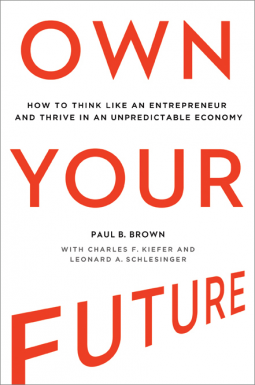
Own Your Future
How to Think Like an Entrepreneur and Thrive in an Unpredictable Economy
by Paul B. Brown
This title was previously available on NetGalley and is now archived.
Send NetGalley books directly to your Kindle or Kindle app
1
To read on a Kindle or Kindle app, please add kindle@netgalley.com as an approved email address to receive files in your Amazon account. Click here for step-by-step instructions.
2
Also find your Kindle email address within your Amazon account, and enter it here.
Pub Date Jun 25 2014 | Archive Date Jul 31 2014
AMACOM Books | AMACOM
Description
It used to be that if you studied and worked hard, you could be assured of an extremely satisfying career. But in a world of constant layoffs and dying industries, it has become increasingly difficult to "plan" your way to success.
So what is the solution? Well, when it comes to dealing with uncertainty, nobody handles it better than successful entrepreneurs. That's why you want to take the same approach they do! Based on extensive research and interviews, Own Your Future shows how to apply the simple model they use--Act. Learn. Build. Repeat--to reinvent the way you maneuver in an unpredictable job market.
Here's how it works. Instead of picturing your perfect career and working backwards, simply begin with the direction you want to go and take a small step. Thinking alone will never change your life--you must ACT. Then evaluate the lessons you learn from that first step, build on them, and take another step in your desired direction. Repeat this process until you have achieved your goal.
When you consider that your job--perhaps even your industry--may disappear, you have no choice but to take control. Filled with stories of professionals of all kinds who have profited from this proactive approach, Own Your Future gives you the tools you need to succeed--no matter what comes your way.
About the Author
PAUL B. BROWN is a long-time contributor to the New York Times and a former writer and editor for BusinessWeek,
Forbes, and Inc. CHARLES F. KIEFER is President of Innovation
Associates, the firm that pioneered the concept of organizational
learning. LEONARD A. SCHLESINGER returned to Harvard Business School as
a Baker Foundation Professor of Business Administration after serving as
president of Babson College.
Available Editions
| EDITION | Hardcover |
| ISBN | 9780814434093 |
| PRICE | $22.00 (USD) |
Average rating from 4 members
Featured Reviews
 John G, Reviewer
John G, Reviewer
When you are facing a future that cannot be predicted with any accuracy, traditional approaches for problem solving (e.g., forecasting, planning, in-depth research) don’t help you much. You need to acknowledge that and find alternatives, according to Charles Kiefer, Leonard Schlesinger and Paul Brown in their book Own Your Future: How to Think Like an Entrepreneur and Thrive in an Unpredictable Economy.
For the majority of people who are not natural entrepreneurs, the thought of an unpredictable future in which carefully laid plans and investments might be wasted is not a comfortable one. The authors say that essentially everyone will be facing this dilemma, other than skilled tradesmen, people who can live with how their profession is evolving, and people who can coast safely into the sunset.
What is the best way to go about surfing on a sea of uncertainty? According to the authors, we need to copy the typical steps of a successful entrepreneur in what they call the ALBR process:
Act: Work out what you want to do, and act by quickly taking a small step towards your goal using whatever means you have at hand.
Learn: After taking the small step, stop to see what you have learned.
Build: Use what you have learned as a foundation for your next steps.
Repeat: Keep following these steps until you are happy with the result or you decide you don’t want or can’t afford to continue.
I suspect that a typical non-entrepreneur who reads the book won’t take a lot of comfort in the ALBR formula. The authors are obviously a lot more comfortable with uncertainty than the typical non-entrepreneur. The book still doesn’t tell you where you should go or where safety can be found, because there is very little safety in a rapidly changing business environment. But if your ship is sinking you are much more likely to survive if you are generating options for action rather than living in denial.
If you want to stay afloat in a rapidly changing business environment, you need to know how to thrive in uncertainty. This book tells you how.



